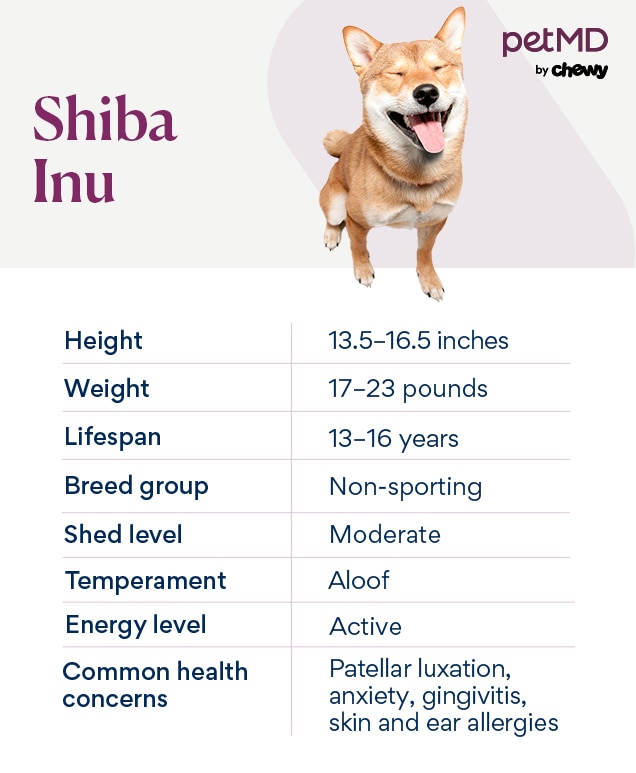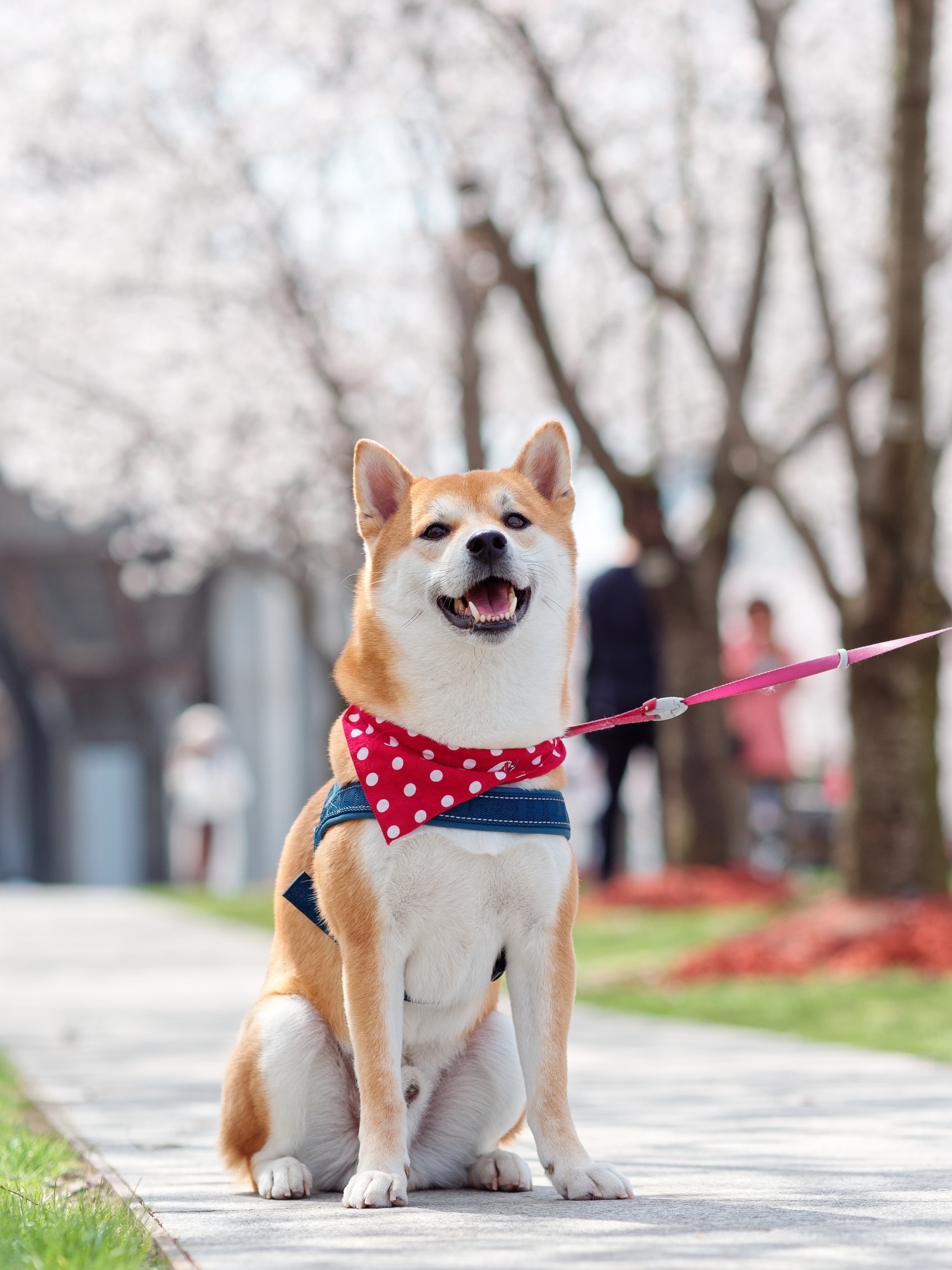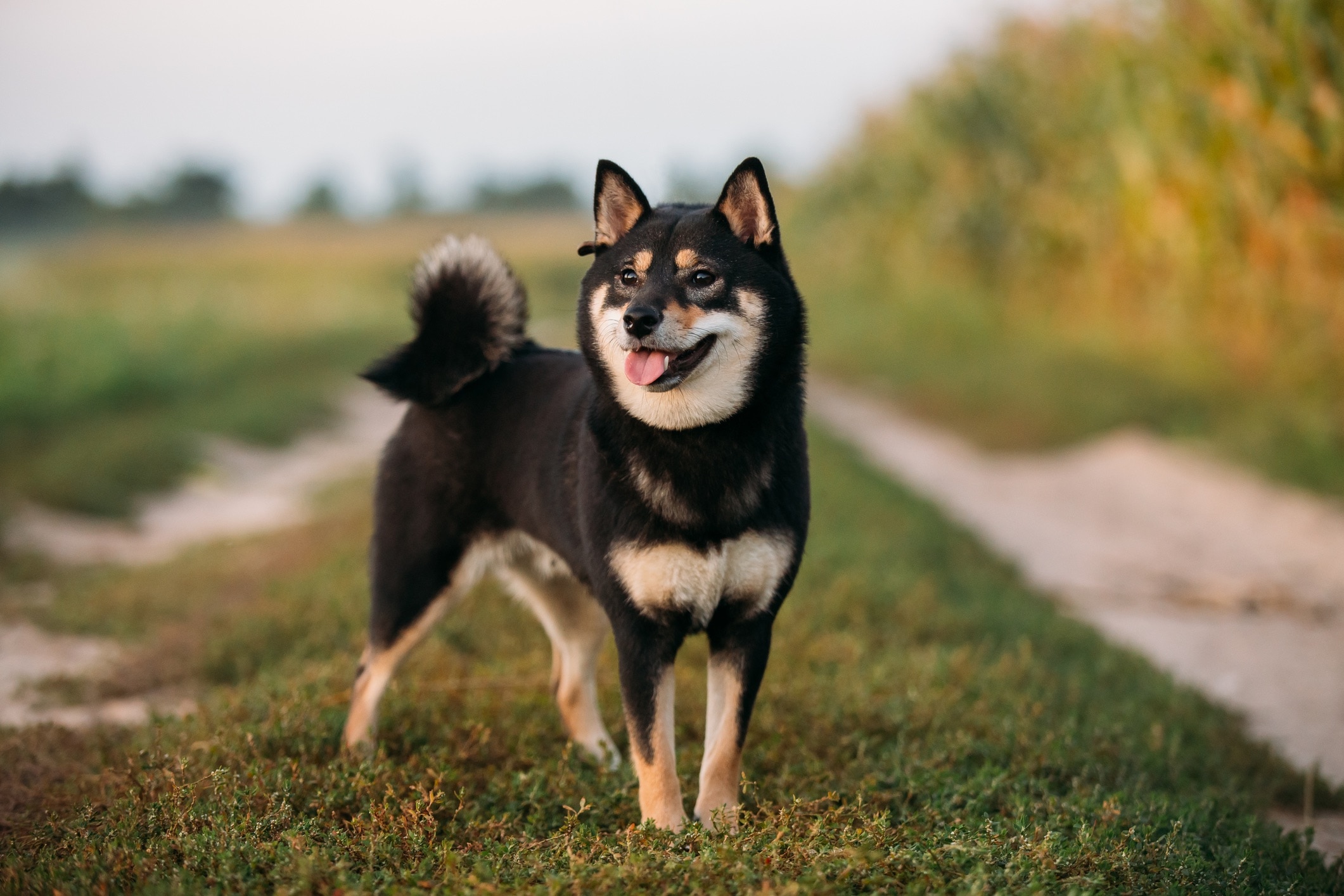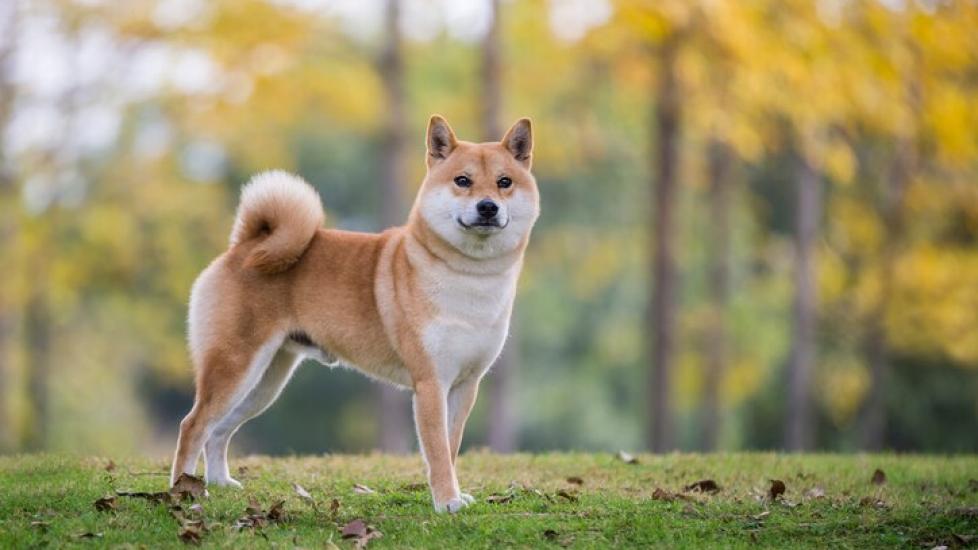Shiba Inu
The Shiba Inu is an ancient dog breed that originated in Japan. Bred to hunt birds, small game, and sometimes even wild boar, according to the National Shiba Club of America, today’s Shiba Inu dogs are more likely to be found lying on the couch than tracking prey.
This Japanese dog has a pointed muzzle and upright ears, which makes them look almost like a fox. Shibas are small and compact dogs, typically weighing 17–23 pounds.
They have a double coat, meaning there is a soft undercoat, and a stiff outercoat of guard hairs that can be up to 2 inches long. Their tail is curled, with thick hair, and is held upright over the body. Some common Shiba Inu colors include red, cream, black and tan, and sesame.
Caring for a Shiba Inu

The Shiba Inu can be a very friendly dog, but they can also be independent and opinionated—which means they are quite vocal, especially if they are feeling stressed or anxious. Anyone who has a Shiba Inu family member can tell you about the “Shiba scream.”
Shibas are high-energy and very intelligent, so they require lots of mental stimulation and exercise. Their high energy and alertness also mean that they can be predisposed to anxiety and undesirable behaviors—like the Shiba scream—without proper exercise.
According to the breed club, Shiba dogs are bold and fiery. This combination, paired with their independent disposition, means they might do best with experienced pet parents who have the patience and consistency to train their Shiba Inu puppy with positive reinforcement.
A Shiba Inu’s double coat means they shed quite a bit, and they need regular grooming to maintain a healthy coat.
Shiba Inu Health Issues
Shiba Inus are, overall, a very healthy breed with an average lifespan of 13–16 years. But, as with all dogs, there are a few health issues to be on the lookout for.
Allergies
They can be predisposed to environmental allergies, which can result in recurring skin and/or ear infections.
Regular bathing and ear cleaning can help to control and prevent some skin and ear infections. There are also medications to help control allergies, which can be prescribed by your veterinarian.
Patella Luxation
Shiba Inu dogs are predisposed to developing patella luxation. This a condition in which the kneecaps are unstable and move out of the normal position.
Patella luxation can cause pain, limping, and eventually arthritis in some dogs, while other dogs are asymptomatic. The condition can be diagnosed by a veterinarian with a physical exam. Treatment typically involves anti-inflammatory medications, weight loss, and exercise restrictions. Surgery is needed for severe cases.
Dental Disease
Like many other small dog breeds, the Shiba Inu is predisposed to developing gingivitis and periodontal disease, or gum disease. This is caused by bacteria damaging the gums, bone, and other supporting structures of the teeth.
To prevent dental disease, it’s important to brush your dog’s teeth every day with a dog-friendly toothpaste. It’s best to begin brushing your Shiba dog’s teeth when they’re a puppy so they become accustomed to it. It’s also important to have their teeth assessed by your veterinarian once a year and professionally cleaned when necessary.
Anxiety
Shiba Inu dogs can have anxiety. This can appear as pacing, barking or whining, and destructive behaviors. An early sign of anxiety is simply hyperalertness, where your dog can’t settle down, is constantly looking around and listening, and just doesn’t seem relaxed.
Common anxiety triggers can be separation from the dog’s family, new people or pets, going to a new place, and loud or new noises; the situation can vary between dogs. Learning your dog’s triggers can help you avoid them, if possible.

Adequate exercise and mental stimulation through walks, training exercises, and play can help to tire out your dog’s brain and body so they feel calm. For intelligent dogs like the Shiba Inu, puzzle toys can help. There are also pheromone diffusers and calming treats that you can purchase over the counter to help your anxious dog relax.
Some dogs do require anxiety medications and specific behavior modification training regimens to help, which can be prescribed by your veterinarian. If you are concerned that your dog has anxiety, speak to your veterinarian to help formulate a plan to best help them.
What To Feed a Shiba Inu
Feed your Shiba Inu a diet approved by the Association of American Feed Control Officials (AAFCO). This means the food is certified to have the standard ingredients and nutritional components for a balanced diet.
A diet designed with glucosamine for joint support and increased fatty acids for skin support is ideal for Shiba Inu dogs. Talk with your veterinarian to find out which food would be the best match for your pup’s needs.
How To Feed a Shiba Inu
A Shiba Inu can be fed dry or canned food. Ideally, adults should be fed twice daily. Shiba Inu puppies need to eat more frequently—three or four times each day.
These dogs can tend to be grazers. If you have multiple dogs, make sure your Shiba isn’t allowed to eat more than their portion. Electronic feeders—like the ones that use your pet’s microchip—can be helpful for ensuring that each dog only has access to their own kibble.
Be cautious of overfeeding, as this can lead to obesity and a slew of other health problems.
How Much Should You Feed a Shiba Inu?
Your AAFCO dog food packaging will include a chart that details how much you should feed your dog based on their ideal weight. But for the best guidance, talk to your vet. They can create a feeding plan based on your dog’s current weight, health history, and lifestyle.
Nutritional Tips for Shiba Inu
Shiba Inus are susceptible to arthritis, especially if they have patella luxation. A good-quality joint supplement containing glucosamine will help to slow the development or progression of joint problems. It may also be helpful to give your Shiba a fatty acid supplement, such as fish oil, to help with skin and coat health.
Talk to your vet if you think your dog could benefit from supplements, and never give supplements to your dog without veterinarian guidance.
Behavior and Training Tips for Shiba Inu
Shiba Inu Personality and Temperament
Shiba Inu dogs are high-energy and highly intelligent dogs that need mental stimulation because they can become easily bored. Puzzles and games are a great option to keep a Shiba Inu entertained.
Shiba Inu dogs are high-energy and very intelligent, so they require lots of mental stimulation and exercise.
As active and curious dogs, Shiba dogs need daily “scent walks” that allow them lots of time to sniff and explore. They also enjoy games with toys and food puzzles, though Shibas also can be very lazy and enjoy just spending time with their family.
Shiba Inu are typically very friendly with people they know, but some can be standoffish with strangers, especially if they weren’t properly socialized as a puppy.
Shiba Inu Behavior
Shiba Inu are alert, active, and sometimes anxious dogs. Adequate exercise and mental stimulation can help manage their anxiety. The use of food puzzles or toys stuffed with food can provide good mental stimulation for Shiba Inu dogs.
Shiba Inu often become very vocal when they are frustrated or upset, and they produce a high-pitched vocalization commonly called the “Shiba scream.” Because of this, Shibas might not be the best fit for apartments or homes with shared walls, as their screaming can annoy neighbors.
Your veterinarian may recommend medication to help relieve your Shiba’s anxiety. This can be especially helpful for vet visits, which can be stressful for these dogs.
Because of their anxiety, Shiba Inu might not be a good fit for families with very young children. But older kids who know how to interact with pets can be OK.
Shiba Inu Training

These Japanese dogs are highly intelligent, which can make them pick up on training cues easily.
That said, Shiba Inu can be independent-minded and opinionated. If they are not interested in what you’re asking from them, they might not follow your cues or scream to signal their frustration.
Taking your time and socializing your Shiba Inu to adapt to new sensations and experiences will help them relax and learn.
Fun Activities for Shiba Inu
- Scent walks
- Scent work games
- Fetch
- Food puzzles and toys
Shiba Inu Grooming Guide
The Shiba Inu has fairly standard and common grooming requirements, such as regular baths and brushing. But Shibas do shed, so be prepared to deal with some dog hair.
Skin Care
There are no special skin care requirements for the Shiba Inu breed. Contact your vet if you notice any changes in your dogs skin, such as redness or flakiness.
Coat Care
Shiba Inu have a thick double coat that sheds a moderate amount. Routine grooming can help manage the shedding.
Be aware that once or twice a year your Shiba Inu will go through a molting period, where they shed a large amount of their coat. A professional groomer can help manage the flying fur during these times.
Eye Care
Shiba Inu have no special eye care requirements. Talk to your vet if you notice any changes to your dog’s eyes or vision.
Ear Care
If your Shiba Inu struggles with allergies, weekly ear cleanings can help prevent inflammation. For these cleanings, you can use a special dog-safe ear cleaner or just a wet paper towel to wipe away any debris.
Be sure to dry the ears after a cleaning—moisture allows bacteria to accumulate, which can lead to an infection.
Considerations for Pet Parents

Shiba Inu dogs are alert, intelligent, and curious. They enjoy mentally stimulating activities and games that allow them to use all their senses. They are quite active, so regular exercise is important.
However, this breed is prone to anxiety and can be very opinionated. When a Shiba Inu is feeling stressed or frustrated, they typically become very vocal—emitting a “Shiba scream.”
Shiba Inu can thrive with proper socialization and desensitization when they are puppies. This can also help them feel more comfortable at the vet or grooming salon.
Shiba Inu FAQs
Is a Shiba Inu a good pet?
Shiba Inu are very friendly and form close bonds to their humans, though they can be fairly independent as well. They can be good pets for people who give them lots of attention and stimulation, but the Shiba’s anxious nature means they might not do well with very young children.
Are Shiba Inu smart dogs?
Shiba Inu are highly intelligent.
What does Shiba Inu mean?
In Japanese, Shiba Inu means “brushwood dog.” While the exact origin of the name is unknown, it is theorized that the name describes the terrain that these dogs originally hunted in Japan.
How much does a Shiba Inu cost?
The typical price of a Shiba Inu varies depending on many factors, such as location, breeder, and bloodline. In general, expect your Shiba Inu puppy to cost anywhere between $1,000 and $3,000. There are also Shiba Inu adoption and rescue organizations you can search.
Featured Image: iStock.com/chendongshan
